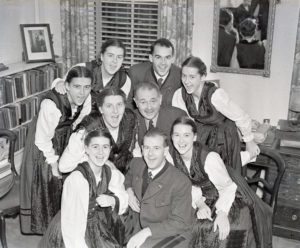Eager to build bonds with your preschooler that will last a lifetime? Want to close that gap growing between you and your teen? The answer, friends, might just be music. Yes, not only is music the language of the soul, music is instrumental to building strong parent-child bonds.
Or so says an important new study from the University of Arizona, which reveals that kids who listen to music with their parents report having stronger relationships with mom and dad than those growing up in music-free environments. Even more impressive? Teens who share music with their parents report feeling especially close to their parents.
“With young kids, musical activity is fairly common—singing lullabies, doing nursery rhymes,” said Jake Harwood, the study’s co-author and head of the university’s Department of Communications. “With teenagers, it’s less common, and when things are less common you might find bigger effects, because when these things happen, they’re super important.”
A Frequency of Love
The study involved a survey of young adults with an average age of 21, and inquired into the frequency with which they engaged with their parents in various music-related activities such as:
- Listening to music
- Attending concerts
- Playing musical instruments
Harwood and the study’s lead author, Sandi Wallace, said they suspect two factors are at work in building the parent-child bond through music: coordination/synchronization and empathy.
Harwood described coordination as a kind of connection that forms between people through shared musical expression. “If you play music with your parent or listen to music with your parents, you might do synchronized activities like dancing or singing together, and data shows that that causes you to like one another more.”
As for empathy, Wallace pointed out that music has long been known to evoke powerful emotions in people. Quite naturally, then, music also “can perpetuate empathy and empathic responses toward your listening partner.”

Both authors stressed that the shared musical experiences do not have to be elaborate affairs. Something as simple as listening to music in the car, playing music at home, or singing and whistling to tunes can help build those parent-child bonds.
“For people who are just becoming parents or have small children, they may be thinking long term about what they want their relationship with their kids to be,” Wallace said. “It’s not to say that this is going to be the prescription for a perfect relationship, but any parent wants to find ways to improve their relationship with their child and make sure that it’s maintained long term, and this may be one way it can be done.”
None of this would come as a surprise to that most musical of families, the von Trapps of “Sound of Music” fame. Stepmother Maria Augusta von Trapp described music as “a magic key to which the most tightly closed heart opens.”
And there are, of course, countless other benefits to music, particularly with regard to children. It makes them smarter, more adept at socializing, and stronger communicators. And now we can add to that list, music leads to better parent-child relationships.
This story has us whistling a happy tune.
